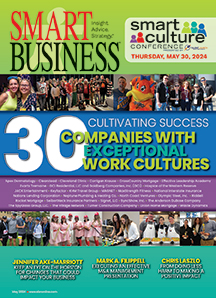When you’re worried
about whether your
customers will be in business next month and you’re
hustling to maintain steady
enough cash flow to meet your
company’s next payroll, giving
back to the community probably isn’t top of mind.
So what effect will this current
economic crisis have on charitable giving in 2009 and beyond?
A recent survey by the online
e-commerce company PayPal
indicates the future might not
be as bleak as it seems.
PayPal’s 2008 Holiday Survey
reported that 10 percent of
1,000 respondents planned to
give more money to charity this
year than they did in 2007. Even
more encouraging was that 71
percent said they planned to give at least the same
amount as they did
last year.
This month, we
recognize an impressive group of honorees through the
2008 Medical Mutual
Pillar Award for
Community Service
program. A common
trend emerged from these
organizations that might provide
a road map to where community service is headed and also
illustrate how businesses and
nonprofits can better approach
corporate philanthropy: change.
Simply put, the era of a scattergun approach to corporate
giving is over.
It’s true that some large companies continue to give to dozens of organizations, but small and
midsize companies
dominate today’s
corporate landscape,
and they employ a
more focused
approach with their
philanthropy.
These businesses
tend to align themselves with nonprofits whose
missions satisfy one of three
objectives: They match corporate goals, match employee
interests or fulfill a deep-held
conviction of the company’s
owner or top executive.
This isn’t a new concept, but
this year’s crop of nominees
indicates a significant change in
corporate philanthropy in that
the practice is nearly universal.
Times are changing, and
those nonprofit leaders who
can read the tea leaves accurately and adjust their fund-raising appropriately should do
just fine.
There’s no doubt that the
next few years will be challenging. Survival on all fronts — for
businesses and nonprofits,
alike — will require a combination of working harder and
smarter than in days past. But
done properly, corporate philanthropy has a bright future.
Thriving businesses require
strong, vibrant communities to
support them. One simply can’t
exist without the other.
Contact Editor Dustin Klein at
[email protected]

